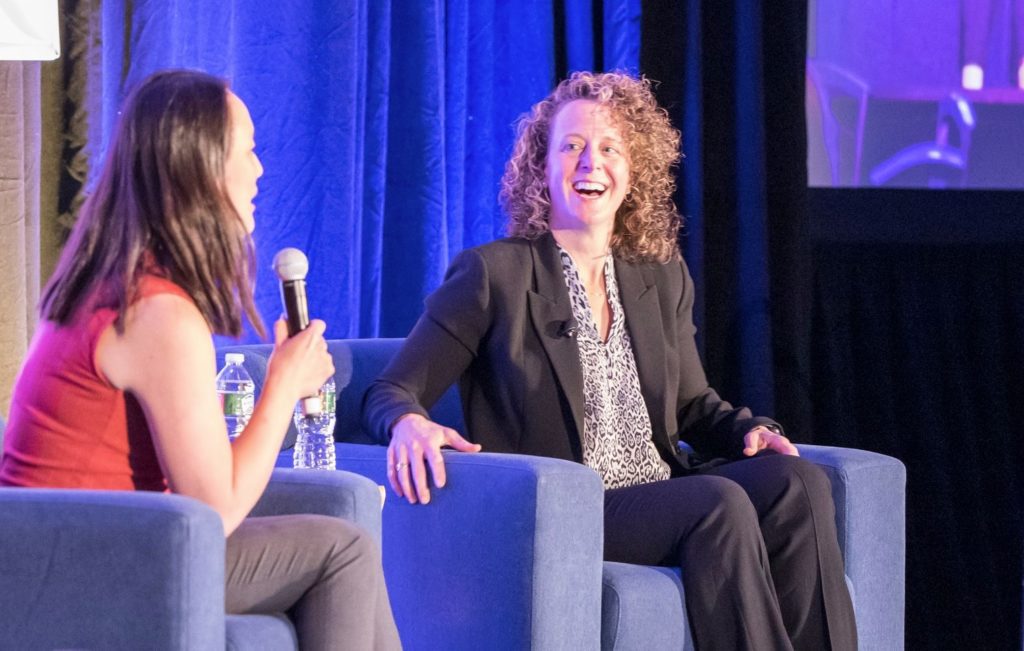Any team with Tom Brady as the quarterback for two decades and a dynasty that resulted in six Super Bowl Championships is going to be able to put fans in the seats. But the New England Patriots didn’t get where they are on the field without an owner who tended to all the important details, and that included the launching of an analytics group that brought baseball’s “Moneyball” philosophy to the gridiron.
Jessica Gelman is CEO of Kraft Analytics Group, which was founded by Patriots owner Robert Kraft at the beginning of the team’s long run of domination on the field — and which contributed mightily to the club’s success in optimizing financially what was occurring in the stadium.
“When things are going great, [a team] can be just a ticket taker, but you need continuous investment in the organization to be able to weather downturns,” Gelman told the CFOs and other finance executives gathered in her hometown of Boston for the 12th Annual CFO Leadership Conference, hosted by Chief Executive Group’s CFO Leadership Council.

A basketball player at Harvard University and a professional hoops player in Israel, Gelman joined the incipient Kraft Analytics Group (KAG) when it was just getting off the ground, in an era when even Amazon wasn’t doing much with all of its customer data but selling books. Since that time, Gelman has led transformative efforts by KAG not only for the Patriots but for many other professional sports teams in using data to build relationships with their fans that keep more of them in the stadium and make them happier when they’re there.
Sports organizations are at a major inflection point now because the U.S. economy is dicier than it has been in many years, inflation is raising many ticket prices, and the pandemic greatly affected how contests are attended. Those developments have created huge questions for what fans will do this year.
“Many organizations are selling season tickets now, for five months from now,” Gelman noted. “And for [professional] basketball, tickets have started to go on sale for next season. That’s why the secondary market for ticket sales has become so important: Because people are buying for the whole season so much in advance now. [Teams] must use data to create more personalized experiences.”
Here are some lessons for CFOs distilled from Gelman’s presentation:
A single view of data is crucial. One of KAG’s most important tasks was to “understand our fans, and there was data at the beginning, but it wasn’t very good,” Gelman said. “Certainly we did not have a single view of the customer, and the Patriots had fans all over the country. But the data wasn’t collected in one location.
“We had the opportunity to create the first data warehouse, and we created a series of data experiments to try to understand customer and move their behaviors based on communications, and improve experiences they were having at games and with their affiliation with the Patriots.”
Drive behavioral change. One major undertaking for KAG was to create a “retention model” for season-ticket holders and use data to make it work. “In this case, there was a series of communications to customers as they started missing games,” Gelman said. “If they missed a second game, there was a survey to see if they had a customer-service issue. The third missed game [prompted] a phone call and intervention. People who [were targeted by] these automatic triggers and received communications renewed [season tickets] at a 10% higher rate than people who didn’t. It was data application to drive behavioral change.”
Mobile is king. Before the pandemic, she said, from 30% to 50% of NFL fans were using their mobile devices to purchase tickets; afterward, it has leapt to 85%. In turn, that transition helped the league gather more data about individual ticket holders and created a “golden record” of every customer, helping teams understand how their attendance was stacking up not only with previous years but with other teams.
“That’s information they need to identify games that aren’t selling very well,” Gelman said. “It was a very significant investment for the NFL. And it was one of the only leagues coming out of the pandemic that didn’t’ have a decline in attendance. The NFL identified nine million new customer records with that platform, and applied it to engaging those fans.”
Account for the times. Most pro sports leagues have enjoyed fantastic runs since the Great Recession, and even through the pandemic, but today’s economics are threatening that success.
“Very severe inflation is concerning, and our clients need to focus on making the best experiences, because fans will have decisions to make,” Gelman said. “Am I [still] going to prioritize this experience with friends and family? It can be quite expensive. How are sports organizations going to change?”








